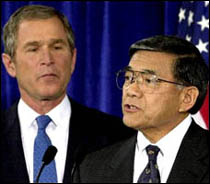| |
Life After the War
 Like these Japanese Americans interred in Oregon, the inmates in Heart Mountain farmed the land. Photo Credit: Library of Congress.
Like these Japanese Americans interred in Oregon, the inmates in Heart Mountain farmed the land. Photo Credit: Library of Congress. |
We lived together at Heart Mountain until April 1943, when my dad got a job teaching Japanese at the University of Chicago, under the Army Specialized Training Program. My mother and I were not able to join him until November 1943 and move to Illinois. We lived there for the duration of the war. When the war ended, the West Coast was reopened to those of Japanese ancestry. We then returned to San Jose, where I graduated from high school.
In 1962, my wife and I visited Heart Mountain, Wyoming. Part of the reason for going back was just curiosity to see what was remaining of the camp. What I saw in 1962 was quite different from what I remembered from when I was a kid.
For one thing, that area was a desert, and the land was not good for growing anything. When people moved into the camps, they started to use the land for growing food. They set in their own drainage and irrigation systems. By growing their own food, they really made that area usable again. The Shoshone River ran nearby, and they created a canal system and a number of irrigation projects of their own, which made the place productive in terms of farm products. Years later, their irrigation projects allowed others to start their own ranches.
 Norman Mineta as then-President-elect George W. Bush nominated him as the U.S. Secretary of Transportation. Photo Credit: Associated Press.
Norman Mineta as then-President-elect George W. Bush nominated him as the U.S. Secretary of Transportation. Photo Credit: Associated Press. |
I have no rancor or bitterness from the evacuation experience, but we are always products of our experiences. I think that my experiences have led me to my feelings about government. Starting in the early 1960s, I started to work in politics. I became the mayor of San Jose and later represented San Jose in Congress where I helped pass the Civil Liberties Act of 1988. This act provided former internees reparations and an official apology for government violations of their civil liberties and constitutional rights.
Think About It
How would you feel if you were evacuated and put into relocation camps? Would you, like Norman, feel no bitterness?

|
|

